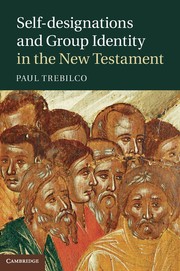
Self-designations and group identity in the New Testament
By Paul R. Trebilco
Subjects: Group identity, Bible, Church history, primitive and early church, ca. 30-600, Biblical teaching, RELIGION / Biblical Studies / New Testament, Bible, criticism, interpretation, etc., n. t., New Testament, Criticism, interpretation, RELIGION, Biblical Studies, Christians, Identification (Religion)
Description: "What terms would early 'Christians' have used when they addressed one another? What would they have called each other? Would they have said, 'Are you a Christian?' or 'Are you a disciple?' or Are you a believer?' How would various 'Christian' groups have answered the question 'Who are we?' And how did authors refer to members of the communities to whom they were writing, and how would these members have referred to each other? Would different 'Christian' groups in different cities at different times during the New Testament period have given different answers to these questions? This will involve us in looking at a range of 'self-designations' or 'labels'. Further, what do their chosen self-designations say about the early 'Christian' movement, its identity, self-understanding, and character? This is the topic of this book. 1.1 what sort of terms are we looking for? How do we tell what is and what is not a 'self-designation'? McConnell- Ginet has helpfully discussed different forms of'labels'. Grammatically we are looking at varied phenomena. Note the following sentences: 1 (a) 'We are children of God.' (Rom 8:16)"--
Comments
You must log in to leave comments.